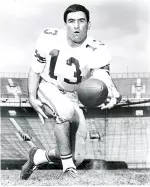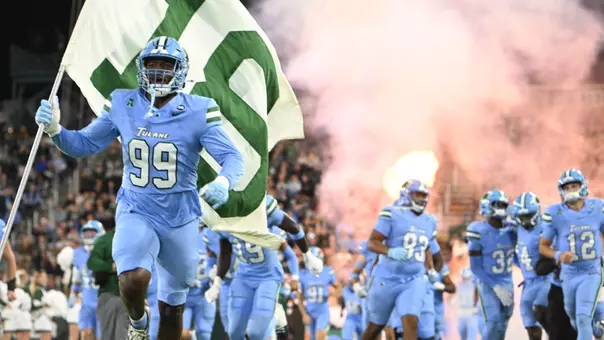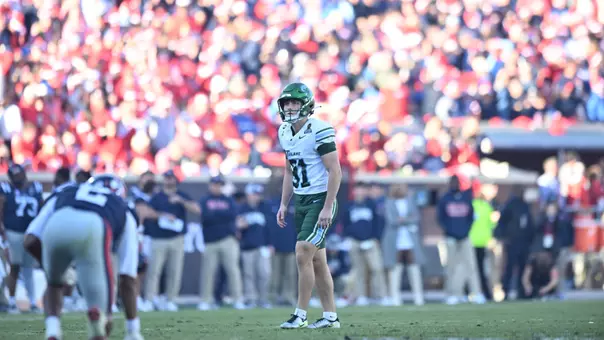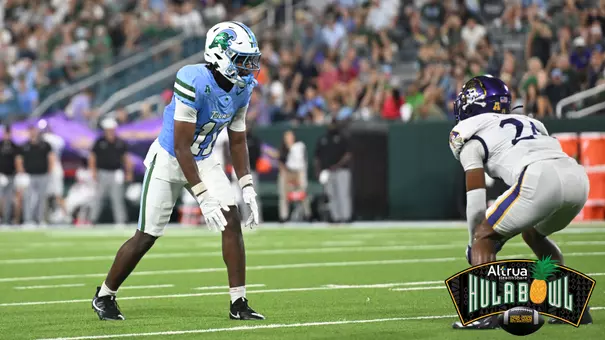
Where Are They Now - Bobby Duhon
Dec 3, 2004 | Football
Dec. 3, 2004
NEW ORLEANS, La. - They say that in time of crisis, true leadership emerges.
That is exactly what happened back two summers ago when word spread that a review of Tulane Athletics could result in a board decision to drop from NCAA Division I-A status.
When he heard about that scenario, former Tulane All-American Bobby Duhon was one of the first to come to the Green Wave's rescue.
Nearly 40 years after wrapping up an outstanding collegiate career on both the gridiron and the baseball diamond, Duhon was again under center and taking the mound for Tulane - but this time the stakes were much higher than a 60-minute football game or a nine-inning baseball affair.
"I got very much involved as to what was happening," Duhon said. "Like a lot of students, I graduated, did my own thing, got away from the school and lost interest in the program. When I found out what was happening, I really felt like it was up to me to step up and give back what Tulane gave to me."
As a result, Duhon has assumed the roll of Ben Weiner Endowment Chairman for Tulane's Perpetual Wave, a campaign whose goal is to raise $65 million in four revenue areas over the next five years. In addition, Perpetual Wave looks to increase ownership in Tulane Athletics by connecting or re-connecting with alumni, students, and the New Orleans and university communities.
"What I'm trying to do is wake up the alumni, and other athletes that myself who have been somewhat successful in life," Duhon said. "And when I ask them why they think they have been so successful, it's always the same - because of Tulane."
While Tulane has now become a big part of Duhon's life, he never really considered the idea of enrolling at Tulane while growing up as a four-sport standout in Abbeville, La. At the time, Duhon and his family often went to LSU games and "took for granted that I was going to LSU." But once the recruiting process started, his attitude changed.
"Charlie McClendon was the coach at LSU at the time, and he did a terrible job of recruiting me," Duhon said. "I was like one of 80 guys that went to a Saturday night game, he treated you like a number, and I didn't like that. I liked the personal touch that Tulane gave me, and Tulane also offered me the opportunity to play both football and baseball."
His decision proved to be a wise one as Duhon would stand out in both sports.
On the gridiron, Duhon became the first Tulane player to post 1,000 total yards in three consecutive seasons, and eclipsed a pair of former All-Americans' records en route to becoming Tulane's single-season and career total yardage leader.
 A two-sport star at Tulane, Bobby Duhon often attended spring football practice directly from baseball practice and worked out in his baseball uniform to save time. |
|
"One of my biggest thrills at Tulane was whenever we played LSU," Duhon said. "I was a freshman when the (football) team got beat 62-0, and that was like having salt rubbed in your wounds. Baseball was my way of getting even. I pitched a shutout against LSU one year, and that was a big thrill for me."
Following his sophomore year, Duhon dedicated himself to football, and he would go on to be named honorable-mention All-American by the Associated Press in 1966 after finishing the year as the second-leading ground gainer in the South and the had the second-must rushing yards of any quarterback in the nation.
Following his senior season, Duhon was selected to play in both the Blue Gray All-Star Game and the Senior Bowl, was named "Cajun of the Year" and his home town of Abbeville honored him with a parade and dinner on "Bobby Duhon Day" on March 2, 1968.
Named a 1967 Preseason All-American as a defensive back, Duhon was drafted by the NFL's New York Giants in the third round of the 1968 draft. Initially, the Giants tried to convert the former college quarterback to safety, but acquiring a defensive back in a trade with the Detroit Lions, the Giants decided to try Duhon at running back.
As a rookie in 1968, Duhon ran for 363 yards and three touchdowns, while hauling in 37 catches for another 373 yards and a score through the air. A knee injury forced him to miss the entire 1969 season, and he had a total of three knee surgeries before deciding to retire from pro football after the 1972 season.
Following his playing career, Duhon stayed in New York where he worked on Wall Street for over 30 years. Now, the 58-year old lives in Atlanta, Ga., where he owns his own money management company, Peachtree Advisors.
And while his home is three states east of his native Louisiana, Duhon is a regular at Tulane games, and plans on being in attendance at today's Navy contest.
"A while back, I took my (former) wife and kids to visit Tulane and Old Sugar Bowl Stadium," Duhon recalls with a laugh. "We walked through the old field house, and they had all the records on the wall there - rushing, passing receiving. We start looking and Roch Hontas was at the top of all of the lists. At that point my wife looks at me and goes, `I thought you were good here!'"
While Hontas may have surpassed Duhon in several of the statistical categories, Duhon's contributions to the Tulane program have not gone unnoticed. In 1980, he was named to the Greater New Orleans Spots Hall of Fame and the Tulane Atletics Hall of Fame, as well.
While Duhon will long be remembered for his accomplishments on the field, it is his current effort far removed from the adoration of thousands of cheering fans and public accolades that may be his most important contribution.
"I think the most important thing is that we all feel Tulane is a very important part of our lives," Duhon said. "We're all very appreciative of the scholarships we received to go there, and we want to continue that legacy."













